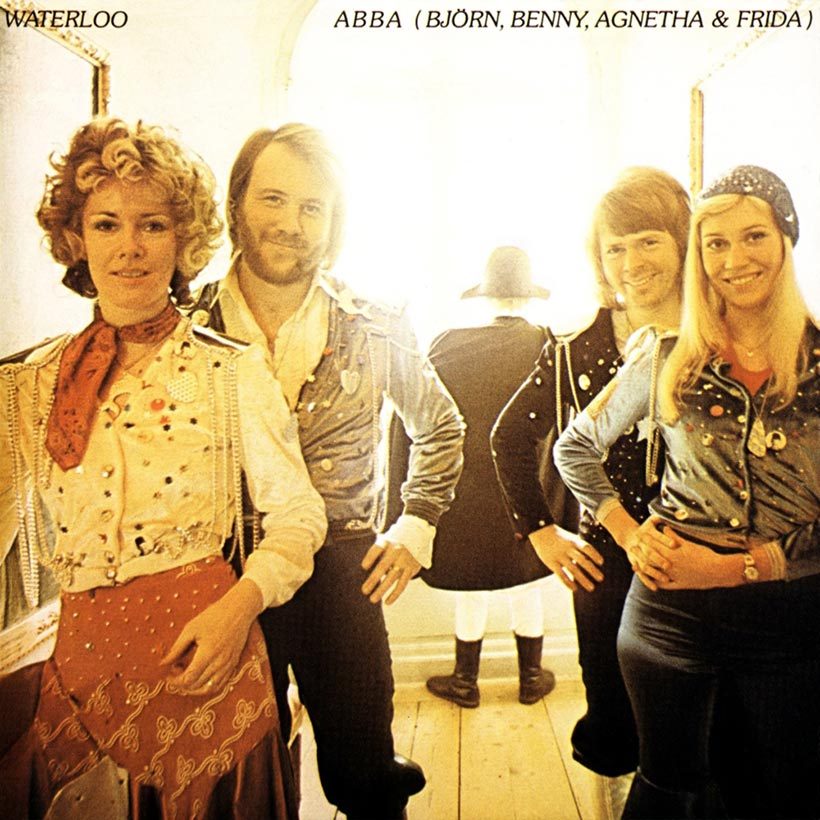How ABBA Conquered All With The ‘Waterloo’ Album
The ‘Waterloo’ album found ABBA hitting all their targets and storming charts around the world.

Dominated by the song that launched their global success, ABBA’s Waterloo album – and its title track – is both a time capsule and timeless. The single’s boundless familiarity is anchored by a legendary glam-pop Eurovision performance in the British seaside town of Brighton on Saturday, April 6, 1974, but the album has much more to offer besides.
Listen to Waterloo on Apple Music and Spotify.
After “Ring Ring” stalled in the domestic heats of the previous year’s Eurovision, ABBA had a lot to prove. Impressive sales in Sweden for that song and its parent album had convinced the quartet their approach was the right one, and sessions for a second album were already underway before the announcement that ABBA, as they were now formally named, were going for Eurovision glory one more time.
A band finding its mark
Later picked as Waterloo’s third single, “Hasta Mañana” started life as “Who’s Gonna Love You.” As a midtempo, conservative ballad, it looked like a safe bet for the contest, but there was something about the more contemporary urgency of “Waterloo” – gloriously pop, but sharper than some of ABBA’s compositions to date – that gave it the edge. It was the right choice. Picked as Sweden’s entry for the competition, “Waterloo” romped home to victory with a comfortable lead and became a worldwide hit, peaking at No.1 in the UK and even making the Top 10 in the US, a market traditionally resistant to Eurovision’s charms.
Released on March 4, 1974, the Waterloo album had already been out in ABBA’s homeland for a month before the competition. A more rounded release than Ring Ring, Waterloo contains a surprising sense of different styles: “King Kong Song” could easily have been recorded by Suzi Quatro; “Gonna Sing You My Love Song” might pass as a Carole King composition; and “What About Livingstone” would have felt at home on a Kinks album. Only the increasing dominance of Agnetha and Frida’s glorious vocals signal that this is an ABBA album – perhaps the first great collection the band produced, and certainly one of the strongest of the era. The Waterloo album captured the sound of a band finding its mark.
Winning the battle for the world’s attention
After the title track, it’s “Honey, Honey” that most people will recognize (in part thanks to its place in the juggernaut Mamma Mia! musical). Lightweight yet catchy, it was released as Waterloo’s second single almost everywhere, though, inexplicably, not in the UK, where studio covers band Sweet Dreams took it into the Top 10. “Honey, Honey” is, however, far from indicative of the album as a whole, which took a noticeable step away from the quartet’s schlager roots.
When Waterloo hit stores, glam rock was at its peak, and there’s little doubt that album track “Watch Out” took its brief from that. Electric guitars even appear to explode at the end of the song – Alice Cooper would have been proud, though Benny and Björn have since expressed mixed feelings about it.
At the opposite end of the spectrum, “Suzy Hang-Around” starts with a 12-string, Byrds-like riff that melts into a unique ABBA moment: a lead vocal from Benny. It’s a charming, melodious gem that perfectly illustrates the versatility of the band. Few would recognize the song as ABBA’s work, but that’s why deeper exploration of their discography yields so many surprises. The tropical, reggae-tinged “Sitting In The Palmtree,” by contrast, is one of the most obvious ABBA tracks overlooked for single release.
Waterloo would do well on album charts around the world, but missed out on the multi-platinum sales certificates that would soon become standard. The four-piece had battled to get the world’s attention and won this first major campaign. Napoleon had indeed surrendered at Waterloo; it was perhaps inevitable the rest of the world would raise the white flag as soon as ABBA hit that Eurovision stage.













Guy
March 5, 2019 at 1:55 am
I don’t think anyone would seriously claim this album “conquered-all”, commercially or critically.
It’s an uneven affair, despite the fun and diversity on offer.
It wasn’t until their third, self-title album that ABBA was able to consolidate the success of the song Waterloo at Eurovision, after which many had written them off as one-hit wonders.
It was the third and fourth singles from ABBA, SOS and Mamma Mia, that became the worldwide chart hits much later, establishing the group as a pop force here to stay.
These udiscover pieces seem to be about uncritical boosterism, rather than serious critiques.
Guy
March 5, 2019 at 1:58 am
My previous, well considered comment was deleted.
Apparently any comment even mildly critical is not permitted.